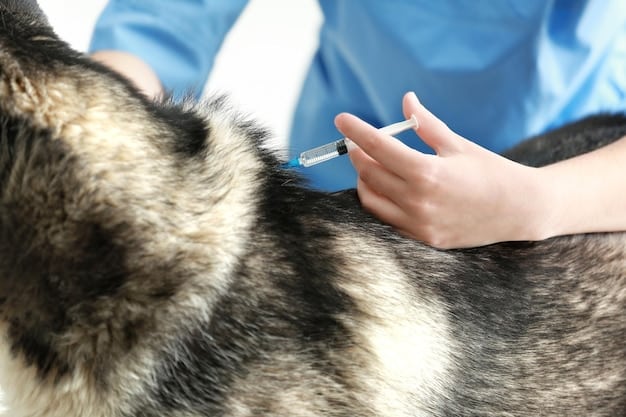Digital Nomad Pet Travel: US Adventures with Your Furry Friend 2025

Digital nomad pet travel in the US in 2025 requires careful planning, from microchipping and health certifications to selecting pet-friendly accommodations and understanding airline or ground transport regulations, ensuring a smooth journey for both you and your furry companion.
Planning to embark on US adventures as a digital nomad with your beloved pet in 2025? Digital nomad pet travel: How to bring your furry friend on your US adventures in 2025 demands careful preparation and understanding. From health regulations to transportation logistics, this guide will ensure a seamless and enjoyable experience for both you and your four-legged companion.
Preparing for Digital Nomad Pet Travel in the US
Embarking on a digital nomad journey across the US with your pet requires meticulous planning. Understanding the specific health requirements, necessary documentation, and transportation options is crucial for a stress-free experience.
This section delves into the initial steps to ensure you and your furry friend are ready for the adventure ahead.
Microchipping and Identification
A microchip is essential for any pet traveling, especially for digital nomads constantly on the move. It provides a permanent form of identification, significantly increasing the chances of reuniting with your pet should they get lost.
Ensure the microchip is ISO-compliant and registered with your current contact information.
Health Certificates and Vaccinations
A valid health certificate from a licensed veterinarian is typically required for interstate pet travel. The certificate confirms your pet is healthy and free from contagious diseases.
Make sure your pet’s vaccinations are up-to-date, including rabies, distemper, parvovirus, and adenovirus. Keep copies of all vaccination records easily accessible.
- Research state-specific requirements: Each state may have unique regulations regarding pet health and entry.
- Schedule a vet visit: Plan a vet appointment well in advance of your travel date to ensure all requirements are met.
- Carry documentation: Keep physical and digital copies of all health certificates and vaccination records.
Thorough preparation of your pet’s health and identification is the bedrock of successful digital nomad pet travel. By taking these initial steps, you’re setting the stage for a smooth and enjoyable journey throughout the US.

Choosing the Right Transportation Method
Selecting the appropriate transportation method is a critical decision when planning your digital nomad pet travel. Whether you opt for air travel or ground transportation will significantly impact your planning and your pet’s comfort.
Each option has its own set of considerations, including regulations, costs, and the overall well-being of your furry friend.
Air Travel Considerations
If you choose to fly, research airline-specific pet policies. Some airlines allow small pets to travel in the cabin, while larger pets may need to travel in the cargo hold.
Understand the size and weight restrictions for in-cabin pets, as well as the carrier requirements. Be aware of potential temperature restrictions that may impact cargo travel during extreme weather.
Ground Transportation Options
Traveling by car or RV offers more flexibility and control over your pet’s environment. You can make frequent stops, ensure they have access to food and water, and minimize stress.
Consider investing in a secure pet carrier or seatbelt harness to keep your pet safe during travel. Plan your route to include pet-friendly rest areas and accommodations.
- Assess your pet’s temperament: Consider whether your pet is comfortable with air travel or prefers ground transportation.
- Research airline policies: Compare pet policies, fees, and restrictions across different airlines.
- Plan rest stops: If driving, identify pet-friendly rest areas and dog parks along your route.
The choice of transportation method should prioritize your pet’s comfort and safety while aligning with your digital nomad lifestyle. Careful consideration will help ensure a pleasant journey for both of you.
Finding Pet-Friendly Accommodations
One of the biggest challenges for digital nomads traveling with pets is securing suitable accommodations. Not all hotels, rentals, and campgrounds welcome furry companions, so advance planning is essential.
This section provides guidance on finding pet-friendly lodging options that cater to your needs.
Pet-Friendly Hotels and Rentals
Websites like BringFido, Petswelcome, and Airbnb offer extensive listings of pet-friendly hotels and vacation rentals. Be sure to filter your search based on pet size, breed restrictions, and any associated fees.
Read reviews from other pet owners to gauge the quality of the accommodations and the pet-friendliness of the staff.
RV Parks and Campgrounds
If you’re traveling by RV, many RV parks and campgrounds across the US welcome pets. Check for any breed or size restrictions, as well as leash requirements and designated pet areas.
Some RV parks offer amenities like dog runs and pet-washing stations.

- Use pet-specific search engines: Leverage websites dedicated to pet-friendly accommodations.
- Read reviews: Get insights from other pet owners about the quality of the accommodations.
- Confirm pet policies: Always double-check pet policies, fees, and restrictions directly with the hotel or rental owner.
Securing pet-friendly accommodations requires diligent research and advanced booking. By utilizing online resources and verifying pet policies, you can ensure a comfortable and welcoming stay for you and your pet.
Navigating Pet-Friendly Activities and Destinations
Exploring the US with your pet offers a unique opportunity to discover pet-friendly attractions and activities. From dog parks to hiking trails, many destinations cater to furry travelers.
This section highlights some of the best pet-friendly activities and destinations to consider for your digital nomad adventure.
Dog Parks and Beaches
Many cities and towns across the US feature dedicated dog parks where your pet can socialize and exercise off-leash. Research local dog parks and their specific rules and regulations.
Some coastal areas offer dog-friendly beaches where your pet can enjoy the sand and surf. Be mindful of leash laws and seasonal restrictions.
Hiking Trails and Outdoor Adventures
Numerous national and state parks allow pets on designated hiking trails. Check the park’s website for specific pet policies and trail restrictions.
Bring plenty of water for both you and your pet, and be aware of potential hazards like wildlife and extreme temperatures.
Planning your itinerary around pet-friendly activities and destinations can greatly enhance your digital nomad experience. Embrace the opportunity to explore the US with your furry companion by your side.
Understanding Legal and Regulatory Requirements
Traveling with pets across state lines requires an understanding of various legal and regulatory requirements. Each state may have its own rules regarding pet health, vaccinations, and breed-specific legislation.
Staying informed about these requirements is crucial to avoid any legal issues during your travels.
Interstate Pet Travel Regulations
Research the specific pet travel regulations for each state you plan to visit. Requirements may include a valid health certificate, proof of rabies vaccination, and compliance with local leash laws.
Some states may have quarantine requirements for pets entering from certain regions or countries.
Breed-Specific Legislation
Be aware of breed-specific legislation (BSL) that may restrict or prohibit certain dog breeds in specific areas. BSL can vary significantly from city to city and state to state.
If you own a breed that may be subject to BSL, research the regulations in each destination before you travel.
- Consult official state websites: Obtain information directly from state agriculture departments or animal control agencies.
- Contact local authorities: If you have questions about specific regulations, reach out to local animal control or law enforcement agencies.
- Stay updated: Laws and regulations can change, so stay informed about any updates or revisions.
By staying informed about legal and regulatory requirements, you can ensure a smooth and trouble-free digital nomad pet travel experience across the US.
Emergency Preparedness and Pet Safety
While planning a digital nomad adventure with your pet, it’s essential to prepare for potential emergencies and prioritize pet safety. Having a plan in place can help you respond effectively to unexpected situations.
This section outlines key steps to ensure your pet’s well-being during your travels.
Pet First Aid Kit
Assemble a comprehensive pet first aid kit that includes essentials like bandages, antiseptic wipes, gauze, medical tape, and any medications your pet requires.
Consider adding items like a tick remover, tweezers, and a rectal thermometer.
Emergency Contacts and Resources
Keep a list of emergency contacts readily available, including your veterinarian, local animal hospitals, and the ASPCA poison control hotline.
Program these numbers into your phone and share them with a trusted contact.
- Learn basic pet first aid: Familiarize yourself with techniques like CPR and wound care.
- Microchip: A microchip is crucial so that your pet can always be identified.
- Have a backup plan: Prepare for unexpected events like natural disasters or sudden changes in travel plans.
By prioritizing emergency preparedness and pet safety, you can minimize risks and ensure a secure and enjoyable digital nomad experience for you and your furry friend.
| Key Point | Brief Description |
|---|---|
| 📝 Health Certificates | Essential for interstate travel, confirming your pet’s good health and vaccinations. |
| 🧳 Pet-Friendly Hotels | Use websites like BringFido to find accommodations. Read reviews and confirm policies directly. |
| 🐕 Dog Parks & Beaches | Many cities offer dog parks and beaches. Follow leash laws and seasonal restrictions. |
| ⚕️ Pet First Aid Kit | Include bandages, antiseptic wipes, gauze, and your pet’s specific medications. |
Frequently Asked Questions
▼
Essential vaccinations include rabies, distemper, parvovirus, and adenovirus. Ensure all vaccinations are up-to-date and documented with a licensed veterinarian. Some states may require additional vaccinations based on your pet’s species or origin.
▼
Use pet-specific search engines like BringFido or Petswelcome to find pet-friendly hotels, vacation rentals, and RV parks. Always read reviews and confirm pet policies directly with the accommodation provider to avoid unexpected issues.
▼
Include bandages, antiseptic wipes, gauze, medical tape, a tick remover, tweezers, and any medications your pet requires. A rectal thermometer is also useful. Learn basic pet first aid techniques before your trip.
▼
Yes, be aware of breed-specific legislation (BSL) in your destination. Some cities or states may restrict or prohibit certain dog breeds. Research BSL regulations before traveling to avoid legal complications or travel restrictions.
▼
Consider your pet’s temperament and comfort. For air travel, research airline policies and ensure a suitable carrier. Ground transportation by car or RV allows for more flexibility, but ensure your pet is safely secured and has access to necessities.
Conclusion
Embarking on digital nomad pet travel adventures across the US in 2025 requires thorough preparation and a deep understanding of various regulations and considerations. By focusing on your pet’s health, safety, and comfort, and staying informed, you can create unforgettable experiences for both you and your furry friend. Remember to always prioritize responsible pet ownership and be mindful of local laws and guidelines.





